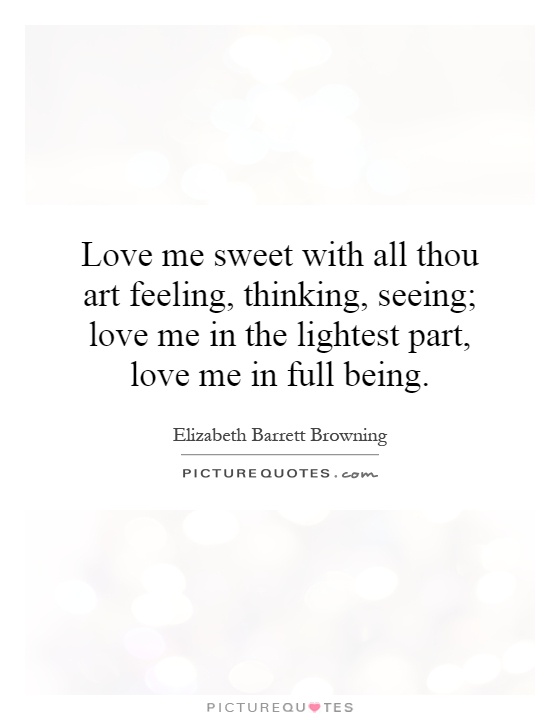Love me sweet with all thou art feeling, thinking, seeing; love me in the lightest part, love me in full being

Love me sweet with all thou art feeling, thinking, seeing; love me in the lightest part, love me in full being
Elizabeth Barrett Browning, one of the most renowned poets of the Victorian era, is known for her passionate and heartfelt poetry that often explores themes of love, faith, and social justice. In her poem "Sonnet XLIII" from her collection "Sonnets from the Portuguese," Browning beautifully captures the essence of true love and the depth of emotion that comes with it.The opening lines of the sonnet, "Love me sweet with all thou art feeling, thinking, seeing," speak to the idea of love that is all-encompassing and all-consuming. Browning is calling for a love that is not just superficial or fleeting, but one that is deeply rooted in the core of one's being. She is asking her beloved to love her with every fiber of their being, with every thought, feeling, and perception.
As the poem continues, Browning implores her lover to love her in the lightest part, in full being. This speaks to the idea of loving someone in their entirety, both in their moments of joy and in their moments of darkness. It is a call for unconditional love, a love that does not waver or falter in the face of adversity.
Browning's words are a testament to the power of love to transcend boundaries and to connect two souls in a profound and meaningful way. Her poetry is a celebration of the beauty and complexity of human emotions, and a reminder of the transformative power of love.
In the context of Elizabeth Barrett Browning's own life, "Sonnet XLIII" takes on an even deeper meaning. Browning's own love story with fellow poet Robert Browning is the stuff of legend, a romance that defied societal norms and family expectations. Their love was a source of inspiration for much of Browning's poetry, and it is clear that the sentiments expressed in "Sonnet XLIII" are deeply personal and heartfelt.












 Friendship Quotes
Friendship Quotes Love Quotes
Love Quotes Life Quotes
Life Quotes Funny Quotes
Funny Quotes Motivational Quotes
Motivational Quotes Inspirational Quotes
Inspirational Quotes